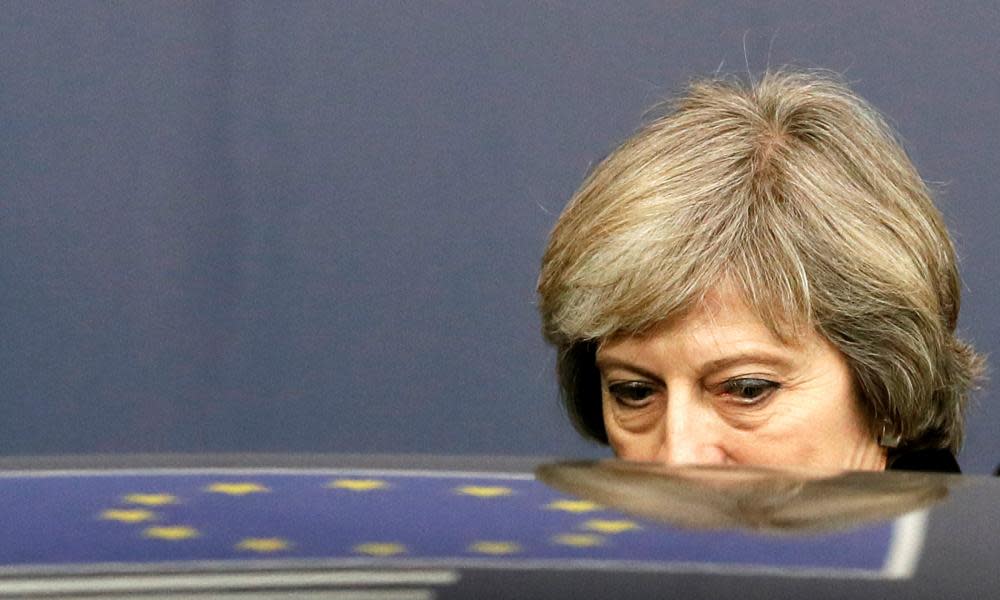Theresa May wants a Brexiteer’s Brexit. She won’t get it without a fight | Keir Starmer

On Wednesday morning, the prime minister will inform the European council that the UK intends to leave the EU. What happens next will be of defining significance for the future of our economy, jobs, security and Britain’s place in the world.
I believe Britain’s response to Brexit must be based on core progressive values: internationalism, cooperation, social justice and the rule of law. A commitment to protect human rights, workplace rights, our environment and to share power and prosperity across the UK. Recognition that in a complex and volatile world we achieve more together than we do apart: not members of the EU, but as partners.
It’s increasingly clear, though, that the prime minister is being led down a very different path: the path of isolation and retreat from our nearest allies and most important trading partners. That is a Brexiteer’s Brexit. Under this view the possibility of Britain leaving with no deal, or at best a threadbare agreement that keeps us at arms-length from Europe is something to aim for, not prevent. And the prospect of changing our social and economic model and ripping up key workplace and environmental protections is seen as an opportunity, not the enormous act of self-harm it would be.
I believe this ideologically driven approach to Brexit would be disastrous and divisive. It would do enormous damage to our economy, living standards and to our society. It would also risk our role in the world as a confident, outward-looking nation.
So on Monday in a speech at Chatham House I will set out how I believe Britain should respond to Brexit. I am setting six key tests for any final Brexit deal. They cover the impact of Brexit on our future relationship with the EU, our economy, national security, fundamental rights, immigration and the distribution of power and opportunity across the country.
The tests are: does it ensure a strong and collaborative future relationship with the EU? This must start with a comprehensive EU-UK trade deal. But it must also include continued cooperation in areas such as counter-terrorism, policing, science, medicine, culture and technology – where working with the EU has delivered significant mutual benefits.
Does it deliver the “exact same benefits” as we currently have as members of the single market and customs union? For this is the standard David Davis has set for the government and it is one I will hold them to. Labour has been clear that jobs and the economy must the priority for Brexit negotiations and that any deal that does not deliver on this will not be acceptable.
Does it ensure the fair management of migration in the interests of the economy and communities? As we exit the EU, there must be a new approach to immigration that has the consent of the British people and is managed in their interests. We need to ensure that the costs and benefits are more fairly distributed, and are seen to be so. The final Brexit deal must contribute to this.
Exiting the EU must not be used as a pretext for rolling back rights or weakening hard-won protections
Does it defend rights and protections and prevent a race to the bottom? We must ensure strong, fair and robust workplace rights remain in our country’s DNA. Exiting the EU must not be used as a pretext for rolling back these rights or weakening hard-won protections. Does it protect national security and our capacity to tackle cross-border crime? The EU has been vital in helping improve cross-border efforts to prevent terrorism and serious organised crime. The final Brexit deal must ensure there is no diminution in Britain’s national security or ability to tackle cross-border crime.
Does it deliver for all regions and nations of the UK? There needs to be a national consensus on Brexit. Yet the prime minister has been unable to gain the confidence of the governments of Scotland, Wales or Northern Ireland as she prepares to trigger article 50. The final Brexit deal must mark a fundamental shift in the government’s approach to devolution.
All of us want the best for Britain, and I do not underestimate the difficulty of the task the prime minister is about to embark on. But the tests I set out today are the yardstick by which Labour will hold the prime minister to account throughout negotiations and how we will judge the final deal she returns with.
I hope the prime minister will see off the Brexiteers on her own benches and do what is right for Britain. But she should be under no illusion that Labour will not support a deal that fails to reflect Britain’s values and the six tests we have set out.

 Yahoo News
Yahoo News 
